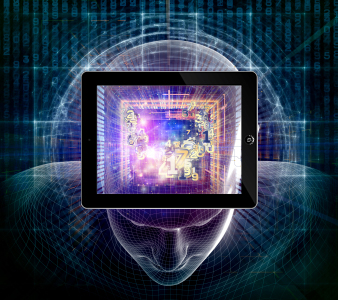
The announcement of the first touch-screen tablet was not a radical or unexpected event. It was predicted several decades ago. Some say science fiction writer Arthur C. Clarke predicted it in 1968, calling it a “newspad” in his novel 2001: A Space Odyssey. Others believe Steve Jobs had the vision as early as 1983 when he said “we want to put an incredibly great computer in a book that you can carry around with you.”
With inventions like the iPad and smartphone predicted many years ago, it makes you wonder what present visions will come to fruition in our lifetime. How will mobile apps and the mobile interface change? And what will come after that?
Perhaps applications will be invisible; email, text messaging, social and app notifications will all appear the same; and the frequency of notification will be based intelligently on interaction. Or, perhaps the new mobile device will have no interface, everything will be based on speech recognition, gestures and augmented reality.
Vignettes of science fiction are starting to become a reality, with the human-to-machine interaction becoming more similar to a person-to-person interaction. Technology is naturally evolving to be more social, more human. And we’re starting to see this in business as well.
While change and innovation in business is often gradual, contextual (most businesses base inventions on what they can sell now and a few years down the line), businesses are rapidly adopting social and mobile technology in the workplace. Over 40% of information workers already use a mobile device and over 72% of organizations use private social networks.
Chances are businesses aren’t ready for employees to approve contracts via voice recognition or view expense reports through augmented-reality-displaying contact lenses. But, they’re seeing the immediate benefits of social and mobile technology. It’s giving employees the information they need from any location: at a meeting with a patient, at a remote board meeting, or just in time to close a deal at a customer site.
Utopia—the ideal state, having no location—but where we’re still able to get work done, is gradually approaching reality.





